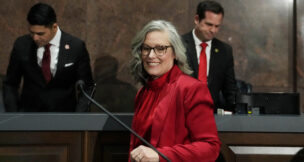State budget analysts give bleak forecast ahead of federal H.R. 1 changes
Jakob Thorington Arizona Capitol Times//October 9, 2025//
State budget analysts give bleak forecast ahead of federal H.R. 1 changes
Jakob Thorington Arizona Capitol Times//October 9, 2025//
Key Points:
-
State budget analysts warns of increasing costs and insufficient funds
-
New federal Medicaid requirements and tax law changes will impact state budget significantly
-
Budget analysts project the state needs more than $1 billion to conform to federal policy
Budget analysts on a legislative Finance Advisory Committee gave a bleak budget outlook for the next legislative session, projecting the state only has $67 million to spend in 2027.
Joint Legislative Budget Committee analysts use the lowest ending balance to project how much money is available for discretionary purposes. The lowest ending balance for fiscal year 2028, which starts on July 1, 2027, is $67 million.
That $67 million is not enough to cover $580 million worth of one-time projects from this year’s budget, which includes school facility repairs and state employee health insurance subsidies. It’s also insufficient to cover the $1.1 billion that analysts expect will be needed to conform to the Trump administration’s “One Big Beautiful Bill,” known as H.R. 1.
JLBC Director Richard Stavneak said during an Oct. 9 committee hearing that the state doesn’t have to conform to all federal tax provisions, but conforming to all of them would cost the state $438 million this year, $336 million next year and $372 million the following year.
The state may also need to pay about $112 million for Supplemental Nutrition Assistance Program administrative costs due to the state’s error rate in the program and the new Medicaid requirements in the federal reconciliation package. The state may also receive up to $750 million from the federal government for border security costs.
“Relative to our $67 million balance, we have already outlined what I believe to be a lot of stress points about what’s going to be competing for that $67 million, like the $1.7 (billion) of stress points in the form of H.R. 1, tax and spending issues, as well as ongoing one-time spending,” Stavneak said.
The state’s projected cash balance is expected to be positive through fiscal year 2028. The state does have $1.6 billion in its rainy day fund, known as the Budget Stabilization Fund.
Jim Rounds, the president and CEO of Rounds Consulting Group, projected in his economic presentation to the Finance Advisory Committee that the state will need about $1.5 billion, an estimation similar to the JLBC’s.
Rounds said he expects the state to face significant challenges with Medicaid — issues that could take five to 10 years at a minimum to solve.
“We do need to get rid of some of the abuse that’s in the system,” Rounds said. “If the federal government wants to do what it’s indicating, I think instead of taking a jackhammer to the current program, it needs to take a scalpel and be a little bit more careful. And then we have a longer period of time for the state to make adjustments. Otherwise, it’s going to cause shocks and it’s going to hurt individuals and families and economic growth across the entire country.”
A JLBC analysis of H.R. 1 notes that the reconciliation package will require the state to start lowering its hospital assessment from 6% starting in fiscal year 2028. The rate would be required to drop by half a percent annually, reducing to 3.5% starting in fiscal year 2032.
The assessment is expected to generate $1.5 billion this year for state matching funds, according to JLBC. By 2032, the state could lose out on $2.1 billion in revenue as a result of H.R. 1.
“Clearly, if you were to lose a lot of the federal dollars associated with the hospital assessment, it would end up having a revenue impact on the state,” Stavneak said.
Ben Henderson, the budget director for Gov. Katie Hobbs at the Office of Strategic Planning and Budgeting, said he was concerned by JLBC’s ending balance projection.
“The Legislature has a lot of policy decisions to make over the next year to two years to figure out how we’re going to prioritize,” Henderson said. “Given all the chaos and turmoil at the federal government, the changes they’re making both to the revenue and spending side, is something we’re going to have to grapple with.”
The state’s request for $750 million in border security funds is still pending, Henderson said. A formal application hasn’t been submitted yet because the state is waiting for guidance from the Department of Homeland Security on how to apply.













































